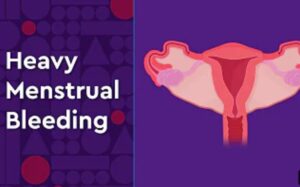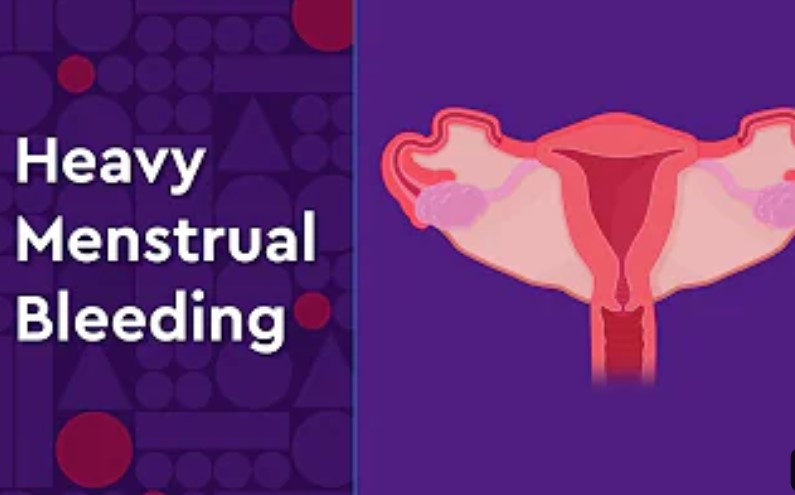11 Causes of Heavy menstrual bleeding: What to do
Heavy menstrual bleeding is a very common complaint among some females of reproductive age. The bleeding can either be increased (heavy) or prolonged. This condition is known medically as menorrhagia.
What is Heavy Menstrual Bleeding
HMB is when a woman suffers a blood loss of more than 80 ml in a single menstrual period. I know you would be wondering how you would measure the blood loss.
In simple terms, you can say a lady has Heavy menstrual blood if she uses more than 16 Soaked sanitary pads (on average) or lasts more than 7 days or both in a single menstrual period.
However, there is no guaranteed way of saying how much menstrual flow is heavy. Most women have a way of knowing how much bleeding is normal for them and can tell when it changes.
It’s about your idea that you think you are losing much more blood than normal.

Cause of Heavy Menstrual Bleeding
HMB can be a result of either hormonal or structural reasons. That is, it can be caused by an imbalance in the body’s hormones, or by a growth in the womb. A few of the common causes of HMB include;
- Fibroids: This is a common cause of increased menstrual bleeding beyond normal. Fibroids are benign growth in the uterus (womb) of a woman. They are estrogen-sensitive. You can read more about fibroids here. One of the common symptoms is heavy bleeding during your menses.
- Adenomyosis: This is responsible for heavy menstrual bleeding in some women. Adenomyosis is a condition whereby endometrial tissues are found deep within the myometrium.
These are the 2 common causes of HMB. Other causes are;
3. Endometrial polyps: a form of growth in the Endometrium of the womb.
4. Coagulation disorders: a problem with the blood that affects its ability to clot. People with this problem can bleed out if nothing is done.
5. Pelvic inflammatory disease (PID): a complication of infections. If untreated can lead to infertility. Read more about this here.
6. Thyroid disease: due to possible over-activity of the gland.
7. Drug therapy (e.g. warfarin): affects the ability of blood to clot.
8. Intrauterine devices (IUDs): could have been inserted for contraceptive benefits.
9. Endometrial Cancer: This is cancer of the Endometrium of the Uterus (Womb).
10. cervical cancer: this is a malignant condition & should be taken seriously. Read more about this here.
What do I Do
Ladies experiencing Heavy menstrual bleeding are requested to visit the hospital & see a doctor (especially a gynaecologist). Your doctor would examine you to find out the cause of the increased bleeding & he/she would guide you on the available treatment options depending on the suspected cause.
Your doctor would carry out a pelvic examination (to check for masses) as well as a cervical examination (to check for polyps or cancer). He/she might also take swabs to screen for infections.
Treatment
For some women, the amount of blood that is being lost is normal. Our concerns are with those who noticed an increased amount of loss more recently. For example, you used 10-12 pads during a period before, and all of a sudden, you are now using up to 16-18 pads. That change is a cause for concern.
Different treatment options are available for the management of the Heavy Menstrual Period. The choice and selection of treatment depend on the cause of the increased bleeding as well as if the woman still wants to have more children.
Medications available for HMB include;
- Nonsteroidal anti-inflammatory drugs (NSAIDs). NSAIDs, such as ibuprofen help reduce menstrual blood loss. They also have the additional benefit of relieving menstrual cramps.
- LNG-IUS: a Form of Hormonal Contraception
- Tranexamic acid/mefenamic acid or combined oral contraceptive pill (COCP).
- Progestogens.
The surgical option includes:
- Endometrial ablation.
- Myomectomy, Hysterectomy, or umbilical artery embolization (UAE) for fibroids.
Your doctor would explain each of them to you and also guide you on the best alternative for you.
Note, do not choose surgical options if you still have a desire to have more children.




